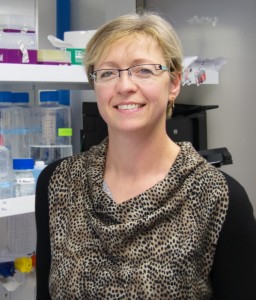
Olivia Grech
After listening to bedtime stories and watching the light switch off, Olivia Grech lay in her new toddler bed next to her mother and tried to fall asleep. Glow-in-the-dark stars stuck to the ceiling shone down on her, but her mother noticed that Olivia never pointed at them.
When Olivia turned two years old, her parents Joe and Deborah Grech took her to a pediatric optometrist for an eye exam. The chart of zoo animals detected no problems with her central vision. As Olivia grew older, her parents knew she saw and behaved differently in dimly lit conditions than her younger sister. At age five, Olivia flew with Joe to Edmonton for the electroretinogram that diagnosed her retinitis pigmentosa—an inherited degenerative eye disease that results in complete loss of vision.
“My vision has gotten progressively worse,” says Olivia, 15, a student at Magee Secondary School in Vancouver.
These days, Olivia has trouble seeing in low light and her peripheral vision is spotty, sometimes obscuring numbers in math problems or causing her to trip over things in the school hallways. She gets extra time to take tests and finish her coursework during the day. After school, she comes home exhausted.
“Olivia copes well,” Deborah says. “She just wants to be like every other kid and she will adjust to make sure that happens.” After the diagnosis, Olivia’s parents sought private genetic testing that determined she has recessive mutations on the PDE6B gene, which instructs the retina to transmit visual signals from the eye to the brain in low-light conditions.

Cheryl Gregory-Evans

Kevin Gregory-Evans
With permission, Olivia’s ophthalmologist shared this information with Kevin and Cheryl Gregory-Evans, Professors in the UBC Department of Ophthalmology and Visual Sciences, who are pioneering a technique to replace the defective part of the gene with an artificially engineered molecule to stop the progression of retinitis pigmentosa.
“Once we knew the defective gene, it opened up doors to possibilities, especially with all the research going on at UBC,” Deborah says. “We’re really pumped by the fact that this expertise and research is local. We’re so blessed.”
The Grechs donated $200,000 to launch a three-year study that will test this technique in a mouse model with Olivia’s exact genetic mutation and in photoreceptors made from Olivia’s stem cells. The Department of Ophthalmology and Visual Sciences matched the Grechs’ gift and is seeking the last $200,000 needed for the project.
“This study is a springboard to developing a new and exciting personalized medicine approach to treating vision loss,” Cheryl Gregory-Evans says. “It may actually have a far-reaching effect for at least 40 other families with similar gene defects, and might have applications to other genes.”
By the end of the three-year study, Dr. Gregory-Evans expects to have tested the technique for the first time in human stem cells and gathered the proof-of-concept data necessary to launch a clinical trial. If the technique is effective, it will prevent future vision loss from the time a patient is treated.
“Olivia has said to me on several occasions that she is confident we will see a cure in her lifetime,” Joe says. “We believe this research is the best opportunity to develop a cure for Olivia and a breakthrough that will enable a cure for so many others affected by this form of blindness.”
These days, Olivia is taking care of her eyes by eating nutritious foods and wearing sunglasses. She is also pursuing her passion for drama, script-writing and video shooting and editing.
“Olivia’s interests are all very vision-based,” Deborah says. “There are other things she can do if her vision continues to deteriorate, but it would be awesome if in a few years, she’s involved in clinical research that gives her the opportunity to go forward on a career path in visual media, if that’s what she wants.”
To support retinitis pigmentosa research at UBC, please contact Kaman Ng at 778.995.8069.